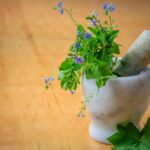Claustrophobia is an anxiety disorder characterized by an intense fear of confined spaces. It can be a difficult condition to manage. It can often lead to panic attacks and can significantly impact daily life. Thus, it is important to manage claustrophobia effectively. While seeking professional help is crucial, including natural remedies in the treatment plan can enhance overall well-being. In this article, we will explore various natural
Natural Remedies for Claustrophobia –
Many natural remedies can be used to treat the symptoms of Claustrophobia. We have listed the top 7 below.
1. Observing Others:
Turning our attention to friends and loved ones can be a valuable approach to managing feelings of claustrophobia. Watching how they navigate confined spaces without showing visible distress helps normalize such environments. Additionally, observing those who remain calm in closed spaces, such as elevators, provides insights and ideas on effectively managing one’s own anxiety in similar situations.
2. Cognitive Behavioural Therapy (CBT):
Although CBT is not a natural remedy and requires assistance from a therapist, it is an effective way to deal with Claustrophobia, CBT involves working with negative thoughts associated with closed places and replacing them with more rational thoughts.
In some cases, Cognitive Behavioral Therapy (CBT) is combined with exposure therapy where a person is slowly encouraged to face their feared situations, depending on their comfort. The idea is to make them comfortable in the presence of the feared situation (which is enclosed places, in the case of claustrophobia). Exposure therapy is given in the presence of a therapist. The therapist also teaches people coping strategies so that they can cope with their anxiety effectively.
3. Relaxation and visualization exercises:
Taking deep breaths, meditating or doing muscle-relaxing exercises can help deal with negative thoughts and anxiety.
It might also be helpful to visualize yourself in a situation where you are in an enclosed space and try relaxing at the same time. Doing this might help you when you are actually in such a situation.
4. Take care of yourself:
It is important that you take good care of yourself. This includes getting enough rest, eating a well-balanced diet and exercising regularly. Taking care of yourself in such ways is naturally important and can help alleviate symptoms of anxiety and panic.
5. Listening to relaxing music:
We all know that listening to certain songs can spark certain emotions, be it sadness, happiness, or anger.
Research suggests that listening to calming or soothing music while in an anxiety-provoking situation can help you relax a lot.
Of course, relaxing music, as with all music, is subjective, and what you find calming for your anxiety, others may not. So, it’s important to find the sort of music that works for you.
6. Natural Herbs:
Natural herbal medicines have long been recommended as a way to treat anxiety, even claustrophobia. During earlier times, a few herbs stood out as ones that may help to reduce claustrophobia. Two in particular are passionflower and kava.
These herbs can be used to treat several disorders, including insomnia. However, its primary use has been a treatment for different forms of anxiety, such as claustrophobia.
Passionflower and Kava may be taken as tablets or capsules, or you may prefer to take these herbs as teas or tinctures.
Other natural herbs have been noted to help with anxiety. Scutellaria laterifolia (Scullcap) and Valerian have been written up as herbs that help the body or mind release themselves from fear.
7. Get distracted:
Trying something that redirects your attention away from distressing thoughts or emotions: for example, running your fingers around the edge of your phone, is a good way of not thinking about the anxiety-provoking situation.
Distractions work because the brain can’t be in two places at once, and shifting attention to any activity will interrupt a string of racing thoughts.
Conclusion
To summarize, claustrophobia can be dealt with in many ways, even without taking medication. It all depends on the severity of your problem. However, if you feel your symptoms may be getting out of hand, then it might be helpful to contact a mental health professional who can advise you on the best course of treatment.
Sources-
-
How To Reduce Anxiety. (n.d.). Headspace. Retrieved March 1, 2024, from https://www.headspace.com/articles/how-to-reduce-anxiety2. published, E. H. (2022, July 27). Natural anxiety remedies that can help you to unwind. GoodTo. https://www.goodto.com/wellbeing/natural-remedies-for-anxiety-228853. Relieve MRI claustrophobia | Natural Herbal Remedies. (n.d.). Retrieved March 1, 2024, from https://two-views.com/mri-imaging/claustrophobia-natural-herbal-remedies.html

